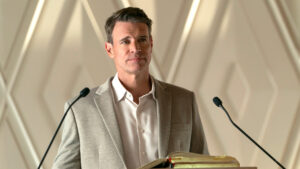Two months into my freshmen year of college, I was forced to admit something had gone terribly wrong with the way I related to food. I’d gained 30 pounds in that short time, double the stereotypical “Freshman 15” some students gain over the course of an entire school year. Deep down I knew my weight gain wasn’t only the result of unhealthy cafeteria food or insufficient exercise. I was eating constantly and compulsively for reasons I didn’t understand—and I couldn’t stop. I felt completely condemned and paralyzed with embarrassment, which I knew wasn’t helpful or biblical, but I had no idea how to think otherwise. I was stuck.
I spent the next 20 years seeking to understand a biblical view of my body and of eating, as well as specifically examining how I’d ended up so trapped and confused. I struggled, prayed, immersed myself in Scripture, and repented. I sought out wise counselors, deep community, and biblical resources. I tried all kinds of practical strategies with varying degrees of success. I experienced seasons of freedom and moments of profound despair. I wondered if lasting freedom was even a realistic possibility.
And then, a few years ago, I slowly began to realize my struggle with food had gradually lessened and was no longer such an all-consuming battle. My ups and downs leveled out. Food didn’t consume my thinking, my weight was stable and healthy, and I no longer viewed myself with shame and contempt. I certainly wasn’t perfect, but I was different. The little victories had added up, and the stretches of freedom had grown longer and deeper. Over time, I’d developed completely different beliefs and habits. I was changed from the inside out. It wasn’t a flashy, overnight turnaround, but it was definitely a miracle.
What I know for sure is that these changes didn’t happen because I had extraordinary willpower or because I finally found a diet fad that magically worked for me. I am different today only because of God’s transforming power in my life. Still, it took a long time for me see any connection between the gospel and my struggles in this area. In hindsight, however, it’s unmistakably clear that these truths were foundational to my transformation and resulting freedom.
Opportunity and Invitation to Experience Grace
In retrospect, I’m tremendously grateful for my struggles with food and body image because God, in his great mercy, used them to bring me to the end of myself. I was a high-achieving, performance-driven young woman who hadn’t faced many challenges I couldn’t figure out how to overcome in my own strength. I firmly believed my salvation was solely based on Christ’s perfect life and death on my behalf. But my inability to stop destroying myself with food brought my desperate sinful state into much clearer focus. It was wildly uncomfortable, and I would have done anything at the time to fix myself.
Thank God I couldn’t! The moments when we run into the brick walls of our own failure and inadequacy are not, as we so often believe, opportunities to prove our own sufficiency. They are gracious chances to experience strength, refuge, and power immeasurably beyond what we could ever provide for ourselves.
Not Changed by Modifying Behavior
I didn’t struggle with food because I simply needed more information about healthy eating. I was an expert at counting calories, measuring portion sizes, and making healthy choices. And I didn’t struggle with my weight because I was lazy or uninformed about exercise. At my heaviest weight, I was exercising rigorously on a daily basis. I overate to escape from the tremendous pressure I felt to perform and please in order to have the approval of others. I overate because I believed I needed the comfort of food in times of stress, sadness, or anxiety.
Only when I was willing to look deeply at the root causes of my disordered eating and honestly confess my sin and unbelief did anything start to change. Until then, I was stuck in the garden of my heart, pulling out the same weeds day after day and getting nowhere. Pulling weeds is important, but it’s only one part of growing a beautiful garden. I didn’t just need to change a few habits or drop a few pounds; my belief system needed to be uprooted and replanted with biblical truth. Responsible stewardship of our physical bodies is clearly biblical, but trying to achieve this goal by focusing solely on changing outward habits doesn’t work for those living from a belief system that opposes the transforming truth of Scripture. The greatest need of a person caught in a trap is rescue, not a strategy for trap-management.
Christ Alone Brings Freedom and Contentment
It was a humbling day when I realized that, while I believed the previous statement in theory, my life told a different story. We’re all tempted in one way or another to justify ourselves apart from Christ, whether with good behavior, success in a certain area, or consistency in meeting a particular standard. Though I never would have said it so blatantly, I functionally believed that in addition to being loved and accepted in Christ, I had to achieve mastery over food and my physical body in order to experience joy or peace. Scripture is clear that food and our bodies are gifts, but it’s impossible to view them this way when we turn them into rulers we constantly measure ourselves against. I began to understand how I pridefully acted as though Christ’s work wasn’t really sufficient; that I had to add something of my own in order for it to be enough. When I finally began consistently resting in the reality that I truly had nothing to earn and nothing to prove, miraculously, food began to lose its power, and my body became a gift for which I was truly thankful.
As I’ve shared my story with others, I’ve been both comforted and also concerned by the reality that my struggles in these areas aren’t unusual or uncommon. Battles with food and body image manifest themselves in a wide variety of ways. They are a significant problem the body of Christ must carefully and lovingly address. My hope is that we won’t only point people to important practical strategies for change, but that the deep truths of the gospel will serve as a foundation for all of our efforts.
For those who seek lasting change and freedom, there is no other option.
Free eBook by Tim Keller: ‘The Freedom of Self-Forgetfulness’
 Imagine a life where you don’t feel inadequate, easily offended, desperate to prove yourself, or endlessly preoccupied with how you look to others. Imagine relishing, not resenting, the success of others. Living this way isn’t far-fetched. It’s actually guaranteed to believers, as they learn to receive God’s approval, rather than striving to earn it.
Imagine a life where you don’t feel inadequate, easily offended, desperate to prove yourself, or endlessly preoccupied with how you look to others. Imagine relishing, not resenting, the success of others. Living this way isn’t far-fetched. It’s actually guaranteed to believers, as they learn to receive God’s approval, rather than striving to earn it.
In Tim Keller’s short ebook, The Freedom of Self-Forgetfulness: The Path To True Christian Joy, he explains how to overcome the toxic tendencies of our age一not by diluting biblical truth or denying our differences一but by rooting our identity in Christ.
TGC is offering this Keller resource for free, so you can discover the “blessed rest” that only self-forgetfulness brings.

































